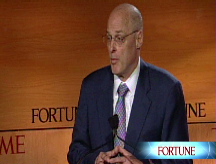Bailout efforts lacking - Oversight board
Oversight panel says department must do more to help homeowners and explain how $700B program is managed.
NEW YORK (CNNMoney.com) -- The Treasury Department must do more to rescue struggling homeowners and ensure that the money it's using to bail out banks is working, according to a draft report by a congressional oversight panel released Wednesday.
The report said that Treasury must establish clear measures to gauge the $700 billion Troubled Asset Relief Program. The special panel, which was set up by Congress to oversee the bailout, also said it is "essential" that the Treasury ensure taxpayer funds are being used for their intended purpose.
"American taxpayers need to know that their money is having a tangible effect on improving financial stability, credit availability, and the economy as a whole," the draft report said. "As a first step, Treasury needs to provide a detailed assessment of whether the funds it has spent so far have had any effect - for better or worse - in these areas."
The final report will be presented to Congress on Wednesday prior to a 10 a.m. ET House Financial Services Committee hearing on the bailout.
The draft report questioned why Treasury had not required banks receiving bailout funds to, in turn, lend more to businesses, noting that a similar government bank rescue in Great Britain mandates that banks lend to small and mid-size businesses. It also implored officials to assure the public that they have plans to address possible further problems in the economy.
"Even in the context of a massive crisis, we cannot manage one battle at a time," the panel wrote. "We need to hear a coherent strategy for managing us out of this crisis."
The panel also criticized Treasury for a general lack of communication with the public. It suggested the Bush administration make clear what financial sector reforms are being imposed, what decision process Treasury uses to determine which institutions get funding and how the plan helps the American taxpayer.
Touching on a politically explosive issue, the report also stated that Treasury must explain why it has not moved forward on a plan by the Federal Deposit Insurance Corp. to use bailout funds to directly help mortgage holders.
In the most scathing part of the report, the oversight panel said Treasury has not explained how its plan to buy up $250 billion in preferred shares of banks will help distressed homeowners stay in their homes. Treasury had initially planned on addressing home ownership by purchasing droves of toxic mortgage-backed securities but later abandoned that initiative.
"Preserving homeownership is an explicit purpose of this Act," said the report. "Given Treasury's shift to direct equity investments in financial institutions, the Department should explain how its broad authority still reflects the purposes of this act."
The panel also questioned why foreclosure relief was not a condition of the Treasury's capital investment plan.
The distressed homeowner issue has also touched a nerve with lawmakers. Barney Frank, chairman of the House Financial Services Committee, in a statement, accused Treasury of a "blatant refusal to enforce any lending obligations" on banks getting money. He said Treasury was "perilously close to a breach faith with those who responded to the Bush Administration's request to establish the program."
On Wednesday, the committee is scheduled to hear testimony from two members of the Congressional Oversight Panel that wrote the report: Harvard law professor Elizabeth Warren and Rep. Jeb Hensarling, R-Texas, who dissented from the panel's report.
The hearing will serve as a follow-up to the oversight panel's report as well as a Government Accountability Office report delivered to Congress last week.
The GAO report said Treasury has yet to address "critical" oversight issues to ensure the plan is working. The study found that the Treasury program needs more staff, better management, an improved transition effort and facilities to ensure banks are using bailout funds effectively.
On Monday, the Senate confirmed a former federal prosecutor, Neil Barofsky, whose job it will be to ensure that the program is not tainted by corruption. ![]()



